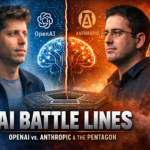The powerful AI talent deal between Google and Windsurf is nothing short of seismic. On July 11, 2025, Google confirmed a $2.4 billion non‑exclusive license and hiring agreement involving Windsurf’s cutting‑edge coding technologies and its visionary CEO, Varun Mohan. This move sidelines OpenAI’s previously planned $3 billion acquisition and accelerates Google’s Gemini and DeepMind ambitions in agent‑driven developer tools.
What exactly happened—and why it matters
- The original target: OpenAI had been in advanced talks to acquire Windsurf for nearly $3 billion, but discussions dissolved amid pushback from backers like Microsoft.
- Google’s pivot: Without taking equity, Google licensed key Windsurf IP under non‑exclusive terms and recruited CEO Varun Mohan along with co‑founder Douglas Chen and senior R&D staff to work within Google DeepMind.
- Deal structure: In return, Windsurf keeps autonomy and monetization freedom, while investors enjoy liquidity. Google focuses on integrating top talent to fuel its Gemini coding push.
Why Varun Mohan is central to this powerful AI talent deal
Varun Mohan, an Indian‑origin MIT graduate, led Windsurf from its 2021 inception (initially as Codeium) into a unicorn valued at $1.25 billion. Under his leadership, Windsurf introduced “vibe coding,” a revolutionary AI‑powered development interface embraced by over a million developers within months. His deep background, from MIT to career-building roles at Nuro, Quora, LinkedIn, Databricks, and Samsung makes him a prized asset in the competitive AI arms race.
What this does for Google and Gemini
- Accelerated agentic coding: Google’s statement highlights hiring “top AI coding talent … to advance our work in agentic coding,” a key area in which Gemini is looking to lead.
- Strategic positioning: This powerful AI talent deal helps Google leap forward in the developer tools arena, taking a decisive step ahead of OpenAI and its Microsoft‑backed Copilot efforts.
- Non-equity license model: By licensing Windsurf tech without acquiring the company, Google avoids regulatory hurdles while strengthening its AI ecosystem.
Windsurf’s roadmap—and what happens to the rest of the team
Most of Windsurf’s 250 employees will remain with the startup, doubling down on enterprise and developer offerings. Jeff Wang becomes interim CEO, with Graham Moreno elevated to president. The company continues expanding its reach, comfortably leveraging its newfound capital and staff stability.
The broader AI talent war
This powerful AI talent deal comes amid fierce competition across Big Tech:
- Meta has hired top OpenAI staff and recruited Scale AI founder Alexandr Wang under a $14.3 billion initiative.
- Amazon and Microsoft are also aggressively “acquihiring” talent through similar licensing and hiring structures.
- OpenAI’s failed Windsurf acquisition underscores increasing complexities in AI partnerships and investor rights .
What lies ahead for developers—and why you should care
- Better coding tools: With Windsurf talent fueling Gemini, developers can expect more advanced, intuitive agentic code assistants.
- Faster iteration: The influx of top-tier engineers into DeepMind means quicker feature releases and iteration cycles.
- Ecosystem competition: Google’s strategic staffing puts pressure on Copilot, Amazon’s CodeWhisperer, and others to innovate harder.











